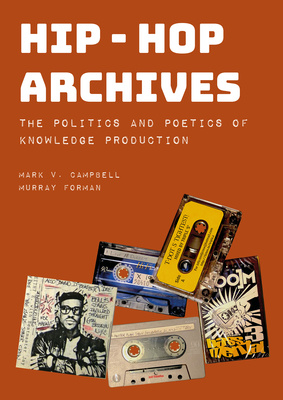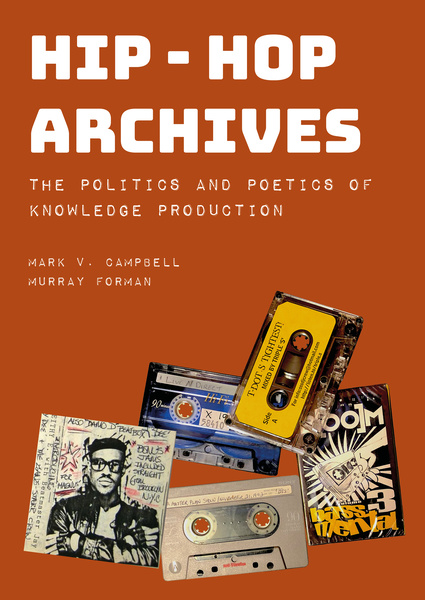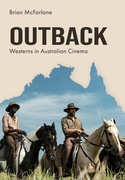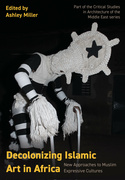Hip-Hop Archives (Book)
The Politics and Poetics of Knowledge Production
Explores multiple aspects of hip-hop archives in a global context, including methods of accumulation, curation, preservation, and digitization. This collection critically analyzes institutional power, geopolitical influences and the ideological implications associated with hip-hop culture’s tensions with dominant social values. 16 b/w illus.
Edition
This book focuses on the culture and politics involved in building hip-hop archives. It addresses practical aspects, including methods of accumulation, curation, preservation, and digitization and critically analyzes institutional power, community engagement, urban economics, public access, and the ideological implications associated with hip-hop culture’s enduring tensions with dominant social values.
The collection of essays are divided into four sections; Doing the Knowledge, Challenging Archival Forms, Beyond the Nation and Institutional Alignments: Interviews and Reflections. The book covers a range of official, unofficial, DIY and community archives and collections and features chapters by scholar practitioners, educators and curators.
A wide swath of hip-hop culture is featured in the book, including a focus on dance, graffiti, clothing, and battle rap. The range of authors and their topics span countries in Asia, Europe, the Caribbean and North America.
Mark V. Campbell is a DJ, scholar and curator. He is co-founder of the Bigger than Hip Hop radio show (1997-2015) and founder at Northside Hip Hop Archive. Mark is an Assistant Professor of Music and Culture at the University of Toronto Scarborough in the Department of Arts, Culture and Media.
Murray Forman is among the first generation of hip-hop studies scholars, his academic research having directly
engaged various facets of hip-hop culture since the early 1990s. His books include The ‘Hood Comes First: Race, Space and Place in Rap and Hip-Hop (2002), and (with co-editor Mark Anthony Neal) That’s the Joint!: The Hip-Hop Studies Reader (1st edition 2004; 2nd edition, 2012) as well as One Night on TV is Worth Weeks at the Paramount: Popular Music on Early Television (2012). An inaugural Nasir Jones Hiphop Fellow at the Hip Hop Archive & Research Institute, Harvard University (2014-2015), he is Professor of Media & Screen Studies at Northeastern University.
List of Figures vii
Acknowledgments ix
Introduction: “An Archival State of Mind” xiii
Mark V. Campbell
SECTION 1: DOING THE KNOWLEDGE 1
1. The Hip Hop Archive and the High School Student: Symbiotic Knowledge Disruption 3
Kulsoom Anwer Shaikh
2. Hip Hop as a Practical and Methodological Issue: Libraries in Russia 19
Sergey Ivanov
3. Hip Hop Dance and the Circulation of Breaking Footage 41
Mary Fogarty and Jason “J-Sun” Noer
4. The Black History 101 Mobile Museum and the Michigan Hip-Hop Archive 57
Khalid El-Hakim
SECTION 2: CHALLENGING ARCHIVAL FORMS 77
5. As We Walk through the Archived Files of All Styles: Archival Practices and Cultural Memory on Battle Rap Forums 79
Sean Robertson-Palmer
6. The Responsibilities and Challenges of Community-Engaged Archives: Lessons from Building the Massachusetts Hip-Hop Archive 96
Pacey Foster
7. The Ballad of “Grandmaster PH”: Contesting Narratives and Lost Archives in Philippine Hip-Hop 114
James Gabrillo
8. Painting, Image, and Cultural Heritage: The Graffiti Mural Fascinate as Visual Ecology 129
Jacob Kimvall
9. Oral History and the Accidental Archive 154
Giuseppe “u.net” Pipitone
SECTION 3: BEYOND THE NATION 167
10. Traces of Solidarity and Breakdown: Domestic Collection in Post-Yugoslav Hip Hop Fanzines and Mixtapes 169
Owen Kohl and Dragana Cvetanović
11. Living Archives: Producing Knowledge about Hip-Hop Culture in East Germany 196
Leonard Schmieding
12. Rap Cubano in the Archive: The Immaterial Paradox 221
Pablo D. Herrera Veitia
SECTION 4: INSTITUTIONAL ALIGNMENTS: INTERVIEWS AND REFLECTIONS 249
13. Nwaka Onwusa (Vice President and Chief Curator, Rock and Roll Hall of Fame) 251
14. Ben Ortiz (Assistant Curator, Cornell Hip Hop Collection) 268
15. Martha Diaz (Chief Curator/Archivist, Hip Hop Education Center and Associate Curator/Archivist, Universal Hip Hop Museum) 281
Afterword 297
Murray Forman
Notes on Contributors 309
Index 317
“The variety of voices in Hip-Hop Archives is impressive. The mix of international contexts, especially incorporating the voices of scenes that developed under oppressive regimes, are eye-opening for the central metaphor of knowledge production. Campbell and Forman truly get at the egalitarian and universal form of hip-hop, while acknowledging both African American roots and the varying reasons some founders are left out, closing with beautiful, insightful, and passionate interviews.”
“This innovative and accessible collection explores hip-hop practices that attest to its longevity, impact, and value. Of course, even with the global dissemination, adoption, and adaptation of hip-hop, this is also about the politics, community, and culture of Black people as the fount of this vital practice and knowledge, underlining the necessity of recording and archiving this history. Many contributors speak from empirical experience and their role in establishing the culture and its preservation attests to book’s authority and authenticity.”














